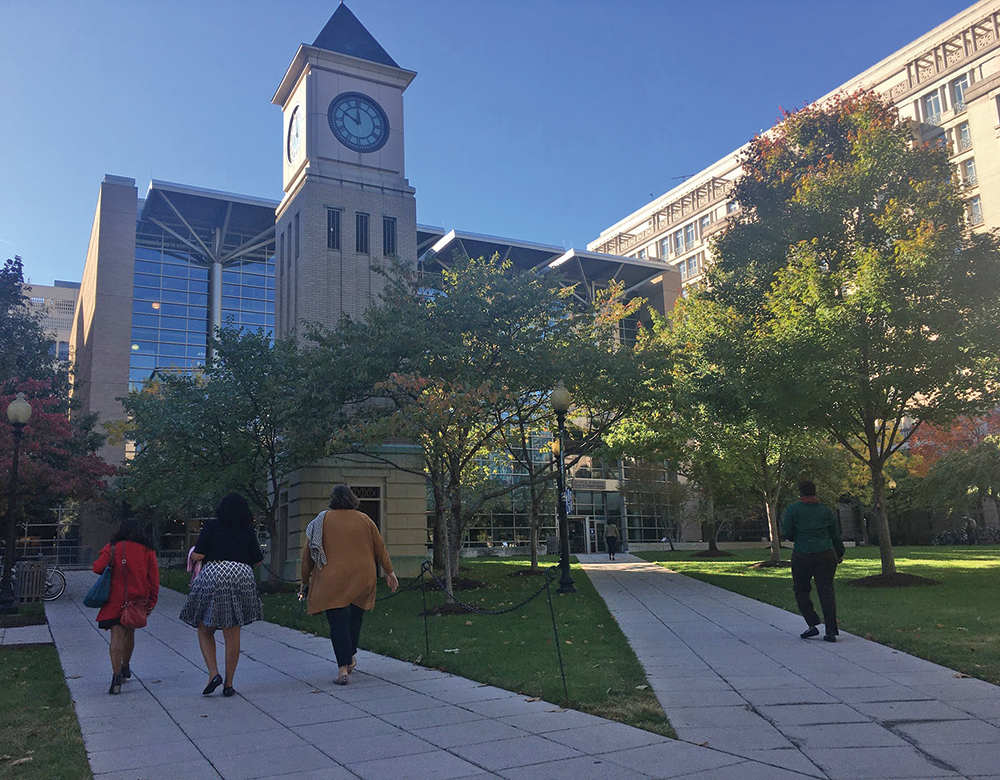The Georgetown University Law Center has reconvened its Speech and Expression Committee to consider changing school policy on inviting speakers and responding to disruptive protests after a law student-led protest prevented an invited speaker from delivering a keynote address last October.
In October 2019, the Law Center invited then-acting United States Secretary of Homeland Security Kevin McAleenan to give the keynote address at its annual policy and law conference. When McAleenan attempted to speak, protestors, which included law students and professors, shouted chants until McAleenan left the stage.

The Speech and Expression Committee will provide recommendations on whether there should be constraints on which outside speakers may be invited to speak on the Law Center campus, how the school should respond to disruptive protests during an event and whether the school should take disciplinary or other administrative action against students, faculty or staff disruptors, according to a Jan. 16 email sent by the Speech and Expression Committee to Law Center students.
Students who participated in the October protest launched a petition Jan. 21 to oppose any potential rule changes, especially those that would punish peaceful protestors, according to Samuel Singleton-Freeman (LAW ’22), who helped craft the petition. The petition received over 140 signatures from students, faculty, staff and alumni by Jan. 26, according to Singleton-Freeman.
The petition, which was addressed to Law Center Dean William Treanor, said the Law Center’s consideration of implementing disciplinary measures to punish protestors undermines its commitment to free speech.
“One does not have to support the cause of a specific protest to know that punishing peaceful protesters would have a chilling effect on free speech and expression across campus,” the petition read. “We urge you to respect the right to dissent. We urge you to not punish protesters and to reject any changes making it easier to punish protesters in the future.”
The Speech and Expression Committee, comprised of students, senior staff and faculty, will review practices at peer institutions and university policies and practices to develop its recommendations. The committee released a confidential Google form and hosted a listening session Jan. 24 to solicit student feedback.
The Law Center held the listening session in accordance with its commitment to upholding its values of free speech and expression, according to GULC spokesperson Tanya Weinberg.
“Georgetown’s Speech and Expression Policy provides that faculty and student groups may invite outside speakers and guests to campus,” Weinberg wrote in an email to The Hoya. “Similarly, it affords the right to members of our community to share their own views and objections about a speaker and to protest peacefully in a manner that does not interfere with the audience’s right to listen and with the safety and security of our campus.”
The committee hopes to find the best way to allow both future speakers and protestors to make their voices heard, according to Weinberg.
“The purpose of the committee process, including the listening sessions, is not to address or punish conduct at past protests,” Weinberg wrote. “The purpose is to consider the best path forward in balancing the competing concerns of the right to speak and the right to protest at the Law Center.”
Rather than only allowing administrators to choose which speakers come to campus, students, faculty and professors should have a say in deciding whose voices should have a platform on campus, according to Jeremy Penn (LAW ’21), who participated in the October protest.
“The situation as its currently structured is that all the power rests in the hands of the administrators, and so, we the students have very limited capacity to pick people as influential as Former Acting Secretary Kevin McAleenan, or any of the many other high profile speakers we have come to campus,” Penn said. “Because there is no accountability by students or by faculty, it’s really really hard to say this is something that is representative of the Georgetown community.”




















